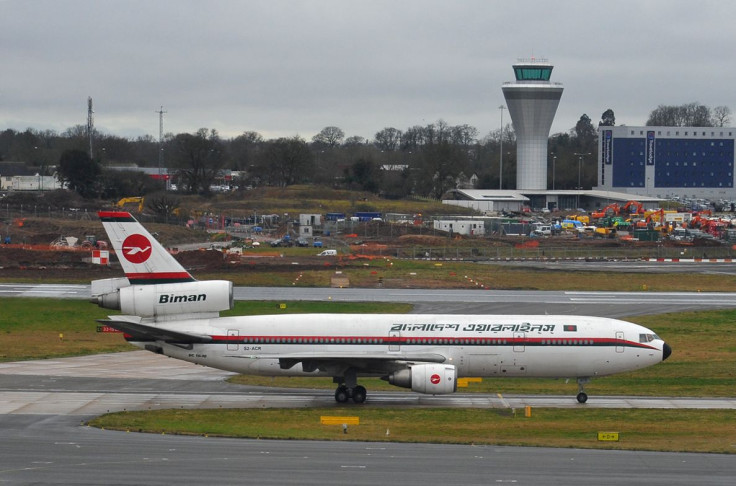Coronavirus Update: Bangladesh Repatriates Citizens From Wuhan, Temporarily Blocks Chinese Arrivals

KEY POINTS
- Bangladesh is an important ally and trade partner of China.
- Bangladesh has temporarily barred the arrival of Chinese citizens.
- Some 500 Bangladeshi students lived in virus-stricken Wuhan
Bangladesh airlifted hundreds of its citizens who were trapped in the coronavirus-stricken city of Wuhan in China over the weekend.
The virus has killed at least 300 people and infected at least 14,000 in China alone. Another 140,000 are under medical observation. Wuhan, the epicenter of the disease, is under a lockdown.
Of the 316 Bangladeshis who were brought back to Dhaka by a special aircraft of Biman Bangladesh Airlines on Saturday, eight with high fever (a symptom of the coronavirus) were sent to the local Kurmitola General Hospital. The other returnees were taken from the airport to Ashkona Hajj camp, a high security area, to be quarantined for the next 14 days, said the Health Minister of Bangladesh, Dr. Zahid Maleque.
Prior to the airlift rescue at least 450 Bangladeshi students in Wuhan appealed to the government through social media to return them home. Prime Minister Sheikh Hasina reportedly ordered her Foreign Ministry to contact China to expedite their departure from Wuhan.
It is unclear when the remaining Bangladeshi students trapped in Wuhan will be repatriated.
Last week, Rakabil Turja, a Bangladeshi engineering student at Hubei University of Technology in Wuhan described the situation in the quarantined city. “All communication, including buses and trains departing from this station have been shut, we cannot go back to our country even if we want to return; we are all having a difficult time,” he wrote on Facebook.
On Sunday the Bangladeshi government sought to temporarily bar Chinese citizens from entering the country by suspending the “visa on arrival” rule for an indefinite period.
Foreign Minister A. K. Abdul Momen said Chinese citizens living and working in Bangladesh have been asked not to leave the country for a minimum of one month.
“Last night [Saturday] we held an emergency meeting and took the decision of not issuing any on-arrival visas for Chinese citizens until the risk of coronavirus [returns] to normal,” Momen said.
Chinese nationals who want to visit Bangladesh must apply for a visa at the country's embassy in Beijing and provide detailed medical reports, he said. In the past, Chinese nationals were able to secure visas upon reaching Bangladesh.
“If [the Bangladeshi] embassy grants [their application] with due scrutiny, only then they will be allowed to come to Bangladesh,” Momen added. “On the basis of friendly relations and bilateral trade, we have been issuing on-arrival [visas] for Chinese citizens for [a long time]. But the situation is now different.”
Bangladesh also informed the Beijing government that it will not allow any new Chinese citizens to work on various infrastructure projects in Bangladesh.
Some 1 million Chinese citizens are already working in Bangladesh.
Bangladesh is an important ally and trading partner of China -- however the travel disruptions caused by the virus will likely delay the progress of major Chinese infrastructure projects in the country.
Such projects include the Padma Bridge, Padma Bridge Rail Link, the Payra Thermal Power Plant, a railway from Chittagong to Cox’s Bazar, a tunnel under the Karnaphuli river, and a planned upgrade of the Dhaka Bypass Road.
Many Chinese workers returned home for the long Lunar New Year holiday, but with travel restrictions imposed by the Dhaka government, their return date is now questionable.
Golam Fakhruddin Ahmed Chowdhury, project director of the Padma Bridge Rail Link project, said about half of the 800 Chinese officials, engineers and workers involved in the project went home for the holiday during the early stages of the virus outbreak.
“We are discussing the [coronavirus] issue, but haven’t made any decision,” he said. “The project may be hampered a little [if things do not improve].”
Another 2,200 Chinese nationals work at the Payra Thermal Power Plant – about 40% of them went home for the holiday or because their job contracts expired.
However, some analysts think the Chinese coronavirus crisis may actually help Bangladeshi exports because the U.S. and Europe could potentially divert orders for garments away from China. (Bangladesh is the world’s the second largest apparel exporter after China).
Bangladesh exported total goods valued at $19.3 billion in the first half of fiscal 2020, a 5.84% decrease from the year-ago period.
“No country will buy goods from China for many more days in this [virus] situation. The orders destined for China may come to Bangladesh in that case,” said Ahsan H. Mansur, executive director of the Policy Research Institute, a Bangladeshi research organization.
Rubana Huq, the president of the Bangladesh Garment Manufacturers and Exporters Association, said: “some immediate [garment] orders from China will be shifted. And major contenders are Vietnam, Cambodia and maybe Bangladesh, if fortune favors us. But this is temporary.”
However, Mansur warned that a pandemic outbreak in China will eventually hurt the global economy “because every country has trade relations with China.”
“Now everything depends on how bad the situation will get,” Mansur added.
Dr. Mohammad Tarikul Islam, an assistant professor of government and politics at Jahangirnagar University in Bangladesh and visiting research fellow at Oxford University in England, wrote that Bangladesh is an important part of China’s South Asia strategy and provides a means of checking India’s influence in the region.
“China has not only provided economic aid to Bangladesh but also signed the Asia Pacific Trade Agreement to remove tariff barriers from commodities imported from Bangladesh,” Islam wrote. “China has offered to develop natural gas resources and nuclear power plants in Bangladesh, to meet its growing energy requirements.”
But Islam pointed out that China’s huge investments in Bangladesh make Dhaka vulnerable to Beijing’s power and demands.
“Bangladesh’s dependence on China has gradually increased, thereby giving Beijing greater leverage in bilateral ties,” he wrote.
© Copyright IBTimes 2024. All rights reserved.





















